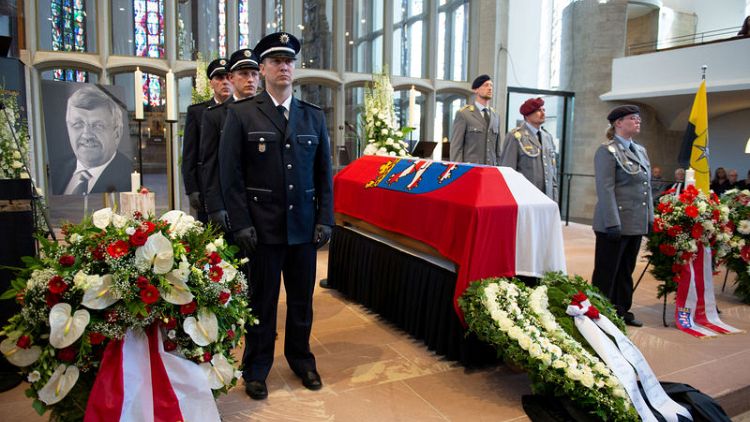BERLIN (Reuters) - The far-right Alternative for Germany (AfD) party must share blame for the killing of pro-immigration conservative politician Walter Luebcke, shot two weeks ago in what prosecutors believe a politically motivated crime, the conservatives' leader said.
In remarks that drew a furious response from the AfD, the largest opposition party in Germany's parliament, Annagret Kramp-Karrenbauer blamed it for legitimising a language of hate that had spurred violence.
"It's quite clear how breaking taboos, using hate and incitement, all things done by the AfD, lowers inhibitions so much that they result in pure violence," she said in Paris in remarks that were reported by German media and later confirmed by her Christian Democrat (CDU) party's press office.
German federal prosecutors said on Monday that the man they had arrested for the point-blank shooting of Luebcke was a far-right sympathiser.
The politician, who headed the regional government in the city of Kassel, was a hate figure on far-right internet forums critical of Chancellor Angela Merkel's 2015 decision to welcome around a million refugees at the height of the refugee crisis.
A defender of the conservative Chancellor's decision, he gave a speech in 2015 advocating "Christian values" such as loving one's neighbour, prompting at least one far-right publication to call him a traitor and publish his address.
The AfD, which surged into parliament two years ago in elections that were shaped by disquiet at the migrant influx, insists it is a democratic party and has always distanced itself from far-right extremists who advocate violence.
"It's Mrs Kramp-Karrenbauer who seems disinhibited," wrote the party's co-leader on Twitter in response, accusing her of "using a murder to discredit political competitors."
But the AfD's current strength - it is the third largest party in the national parliament and vies for first place in regional polling in the east - has caused disquiet in a country that has built its post-war rehabilitation on utter repudiation of the Nazi regime of wartime leader Adolf Hitler.
Senior AfD politicians have questioned the prominence in Berlin of the memorial to the millions of Jews murdered in the Nazis' Holocaust, and domestic security services charged with monitoring the threat of extremism have opened preliminary inquiries into the party.
(Reporting by Joseph Nasr and Andreas Rinke, writing by Thomas Escritt, Editing by William Maclean)
